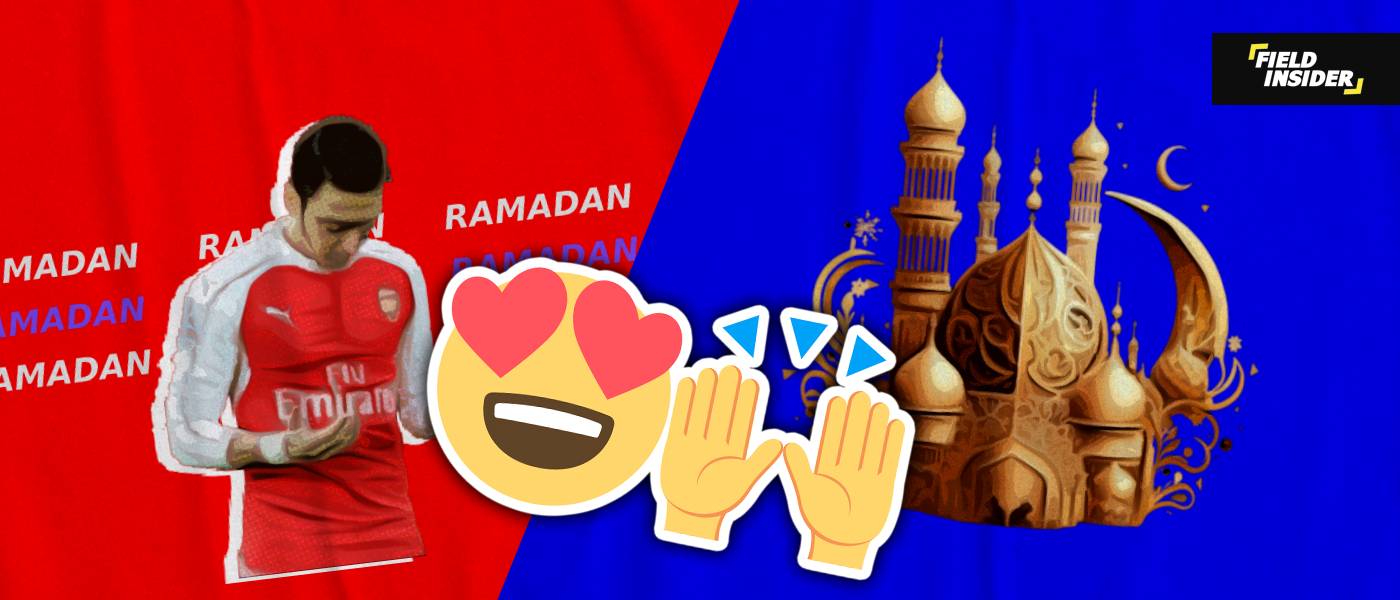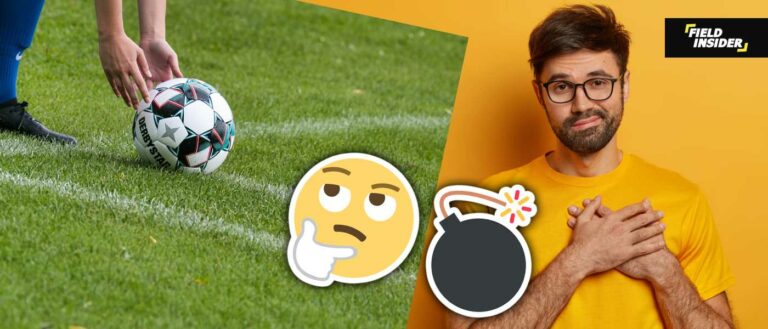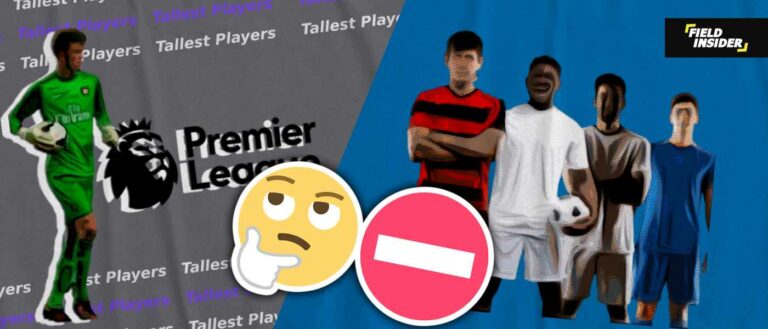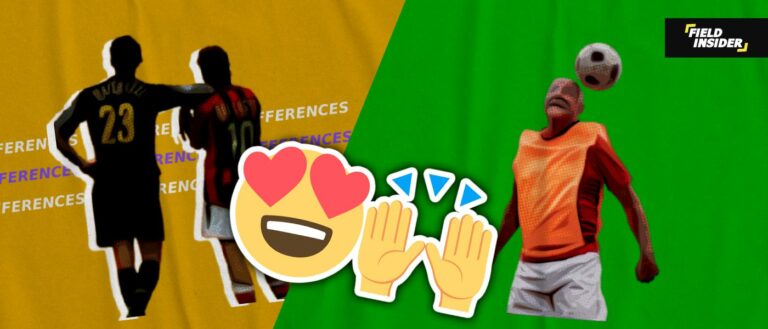How Do Muslim Footballers Fast? Full Guide
Ramadan holds a deep spiritual significance for Muslims worldwide, marked by a month of fasting from dawn to sunset. This practice, while fostering spiritual growth, presents unique challenges for Muslim footballers who must balance their religious obligations with the physical demands of their sport.
This guide delves into how these athletes navigate fasting during the holy month, maintaining peak performance in training and matches.
Key Takeaways
| Aspect | Key Takeaways |
|---|---|
| Ramadan Fasting | Involves abstinence from food and drink from dawn to sunset, focusing on spiritual growth and self-discipline. |
| Challenges for Athletes | Dealing with dehydration, fatigue, and nutritional challenges during training and matches while fasting. |
| Strategic Approaches | Customizing training schedules, focusing on nutrition, and mental preparation are essential for maintaining performance during Ramadan. |
| Prominent Examples | Stories of Muslim footballers, including those vying for the Golden Boot or UEFA Player of the Year, observing Ramadan fasting. |
| Cultural Respect | The importance of cultural sensitivity and inclusivity in sports, accommodating athletes’ religious practices. |
Understanding Ramadan Fasting

Abstinence from Food and Drink
During Ramadan, Muslim footballers abstain from both food and drink from dawn until sunset. This practice, going beyond mere physical endurance, is a profound expression of faith and self-control.
It’s an exercise in spiritual purification and discipline, resonating deeply within the Muslim community. For athletes, this means managing their energy and hydration levels to maintain peak performance.
Focus on Spiritual Growth and Self-Discipline
Ramadan’s fasting is not just a physical act; it’s a period of intense spiritual reflection and growth. Footballers, while adhering to their professional commitments, engage in a personal journey of self-discipline and spiritual renewal.
This period is about cultivating patience, empathy, and a heightened sense of spiritual awareness. It’s a time when players might reflect on their personal and professional journey, aligning with the broader values of discipline and resilience.
Challenges Faced by Muslim Footballers

Maintaining Physical Performance
One of the primary challenges for Muslim footballers during Ramadan is sustaining their physical performance.
The absence of food and water from dawn until dusk can significantly impact their stamina and strength, essential for peak performance during training and matches.
Dehydration and Nutrition Management
Dehydration is a major concern for fasting footballers, as it can lead to decreased muscle performance and increased fatigue.
Managing nutrition effectively within the limited non-fasting hours is also critical, requiring a careful balance of carbohydrates, proteins, and fats to maintain energy levels.
Mental and Emotional Well-being
The mental and emotional aspects of fasting, such as coping with hunger and thirst while meeting the demands of professional sports, can affect concentration and mood.
Developing mental toughness and resilience is crucial for athletes during this challenging period.
Balancing Religious Commitments with Professional Obligations
Muslim footballers face the challenge of balancing their religious obligations with the demands of a professional football career.
This includes managing expectations from coaches, teammates, and fans while adhering to their religious practices, necessitating understanding and support from the sporting community.
Strategies for Muslim Footballers During Ramadan
Customizing Training Schedules
Adapting training routines to accommodate the physical and nutritional needs during Ramadan is crucial for Muslim footballers.
Adjusting the intensity and timing of training sessions, possibly scheduling them closer to Iftar, helps in aligning with their energy levels. This strategic flexibility is similar to the adaptive approaches discussed in football training.
Focusing on Nutrition
Optimizing nutritional intake during Suhoor and Iftar is essential to ensure sustained energy levels and recovery. Emphasis on nutrient-dense foods and proper hydration strategies becomes paramount.
This approach mirrors the nutritional tactics outlined in benefits of children training in soccer, emphasizing the importance of a balanced diet for athletic performance.
Mental Preparation
Mental preparation during Ramadan is as crucial as physical readiness. Developing mental resilience helps athletes maintain focus and discipline despite the challenges of fasting. Techniques for mental strengthening are vital for success both on and off the pitch.
Communication and Support within the Team
Effective communication with coaches and teammates about the unique needs and challenges during Ramadan fosters a supportive environment.
This mutual understanding and adaptation of training and match strategies are crucial, as highlighted in principles of team cohesion and support in football team cohesion.
Prominent Muslim Footballers Who Fast During Ramadan
The stories of Muslim footballers who observe Ramadan fasting while maintaining their professional commitments are both inspiring and enlightening.
Their experiences offer valuable insights into how dedication, discipline, and faith can harmonize to achieve excellence in sports.

Mohamed Salah (Liverpool FC)
Egyptian forward Mohamed Salah, playing for Liverpool FC, continues to observe Ramadan fasting even during crucial matches.
His commitment to maintaining top performance levels without food or water from dawn to dusk exemplifies his dedication to both his faith and professional career in football.
Paul Pogba (Juventus)
Paul Pogba, now a midfielder for Juventus, has a history of observing Ramadan fasting, even during his time at Manchester United.
His ability to balance the physical demands of top-tier football with his religious practices highlights the discipline and dedication required at the highest levels of the sport.
Karim Benzema (Al Ittihad)
Karim Benzema, the skilled French striker, now playing for Al Ittihad, continues to balance his professional football career with his religious obligations during Ramadan.
His performance, particularly during this challenging period, demonstrates his commitment to both his faith and his role in demanding football matches.
Sadio Mané (Al Nassr)
Senegalese forward Sadio Mané, known for his impressive agility and pace, now with Al Nassr, observes fasting during Ramadan.
His ability to maintain top performance levels while fasting is a testament to his physical and mental fortitude in the demanding world of professional football.
N’Golo Kanté (Al Ittihad)
N’Golo Kanté, the French midfielder known for his extraordinary work ethic, now plays for Al Ittihad.
Despite the physical demands of his playing style, Kanté’s observance of Ramadan fasting exemplifies his resilience and commitment to balancing his religious beliefs with his professional football career.
Effect of ramadan in footballers
Two Algerian professional soccer teams (55 men) were studied to know about the impact of Ramadan on physical performance in professional soccer players.
The findings from the study “Zerguini Y, Kirkendall D, Junge A, Dvorak J. Impact of Ramadan on physical performance in professional soccer players” were published back in June 2007, as follows;
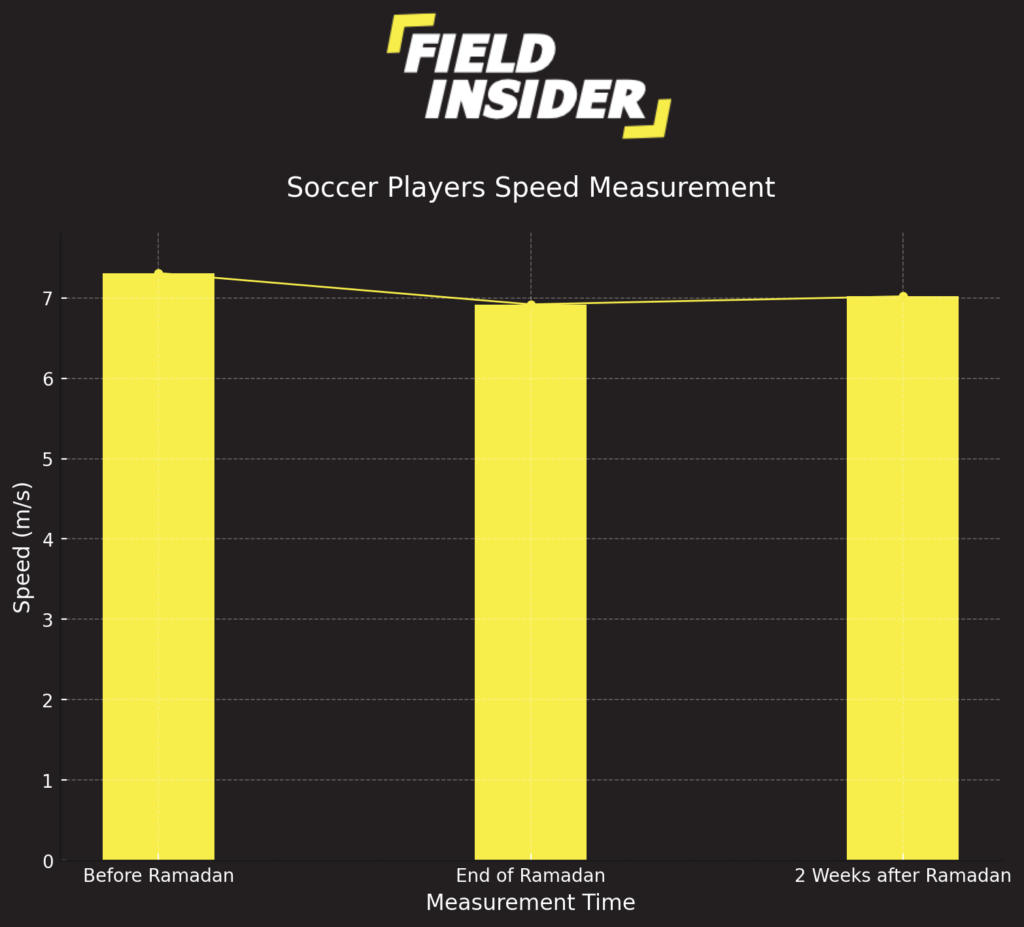
The bar chart visualizes the change in speed measurements for the soccer players at three different points in time relative to Ramadan:
- Before Ramadan: The players’ speed was the highest, with an average of 7.31 meters per second.
- End of Ramadan: There was a noticeable decrease in speed, with an average of 6.92 meters per second. This suggests a decline in performance, which could be attributed to the effects of fasting during Ramadan.
- 2 Weeks after Ramadan: The players’ speed shows a partial recovery to an average of 7.02 meters per second, which is closer to the initial measurement but still not fully back to the pre-Ramadan level.
This indicates that while there is some improvement after the end of Ramadan, it may take longer than two weeks for the players to return to their baseline performance levels.
The findings suggest that Ramadan fasting may have a short-term impact on the players’ speed, which doesn’t fully rebound within two weeks after Ramadan concludes.
Cultural considerations and respect
Recognizing Diverse Beliefs and Practices
Cultural sensitivity in sports begins with recognizing and respecting the diverse beliefs and practices of athletes, including those observing Ramadan.
It’s about understanding that players like Salah, Pogba, and Mané have unique requirements during this time. Acknowledging these differences is crucial for fostering an environment where all athletes feel respected and valued.
Adjusting Training and Match Schedules
Adapting training and match schedules to accommodate fasting players is a significant aspect of cultural sensitivity. This might involve scheduling training sessions later in the day or allowing breaks for players to break their fast at sunset.
Educating Team Members and Staff
Education plays a key role in cultural sensitivity. Teams and organizations should educate their members and staff about the significance of Ramadan and the specific needs of fasting players.
This understanding helps in creating a supportive team dynamic, much like the camaraderie developed through initiatives discussed in teamwork in youth soccer.
Supporting Nutritional and Physical Needs
During Ramadan, the nutritional and physical needs of fasting players are unique.
Teams should provide support by collaborating with nutritionists and fitness coaches to create tailored meal and hydration plans, ensuring players maintain their health and performance.
Conclusion
In summary, Muslim footballers observing Ramadan demonstrate a remarkable balance between their spiritual commitments and the demands of professional football.
This insight into their journey during Ramadan underscores the broader significance of cultural sensitivity and inclusivity in sports. It’s a powerful reminder of how sports can bridge diverse cultures and beliefs, fostering an environment of respect and understanding that transcends the playing field.


